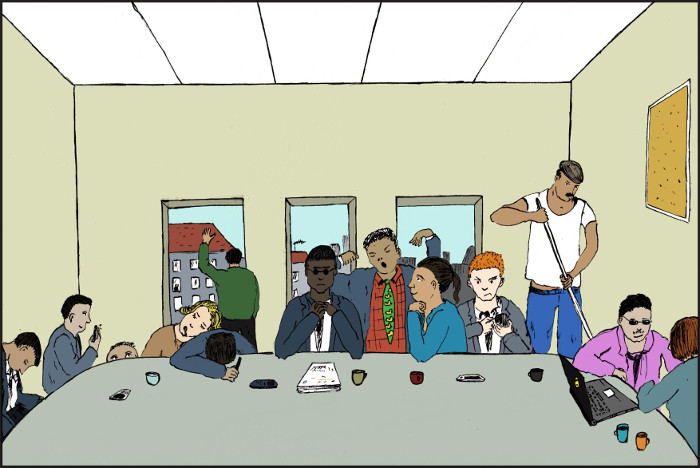A lot of gibberish, not enough action.
Office meetings are at the end of the rope. Like ourselves when we come out of one. It’s urgent to initiate a change. Everyone seems to agree on this. Still, decisions to answer this issue remain few, scattered and thus, considered inefficient.
Those who refuse change are therefore reassured in their beliefs.
However, if urgency there obviously is, it does not mean one should bring change hastily, just because we read that it is in “the spirit of our times”. No, this reform should be initiated and brought about within a clear, well thought-out, global and long-term strategy. Well, all you need to do now is call for a meeting!
At last, a relevant PowerPoint!
People often feel useless during a meeting. Their mandatory presence was far from indispensable. And they often walk out of the room feeling nothing new has been said, and that it only confirmed what they already knew. That is, not much.
A vicious circle appears: we do not feel involved in what’s going on, so we do something else, and feel even more useless. A deflationary spiral of motivation and exponential curve of boredom. That’s what all these mind-numbing graphs and Powerpoints inspire us.
“Creationist” management.
Praising the efficiency and benefits of the traditional meetings is being the devil’s advocate. It expresses what I would call a “creationist” management practice: an all-mighty and inaccessible lecturer, a predetermined and rigid program, squashed creativity…
The solution will come from upstairs, like a miracle falling on our laps, and will therefore not resolve much. Even if it’s a good solution.
Order comes from chaos.
It is now time to draw a clean slate and make room for collaborative workshops, a highly evolutionist meeting technique!
The example given by Harrison Owen’s Open Space Technology is inspiring. A simple, yet revolutionary idea, based on the concept of self-organization, of structured and necessary chaos.
Such meetings reflect, according to him, the process of life itself, its organizing capability of multiple variables (yes, you) all connected to one another in a, seemingly, perfectly random way.
Mathematics call it the science of complex systems. In management we call it… well management I guess. It looks as though managers were trying, with their wearying and exhausting meetings, to suppress the very same thing they are expected to manage: the human variable.
Illustration by Germain Jammernegg
